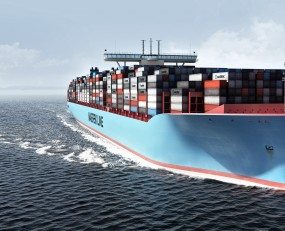
Maersk may be working to create what it calls an “integrated transport company” with new technology at its core, but the commoditised nature of container shipping continues to pull it down to earth.
That is not to say its annual or indeed fourth quarter results for 2017 were bad. For the twelve months, revenue was up 13% at US$30.9bn whilst EBIT was up 162% to $641m. However, income from continuing operations was still negative to the tune of $194m although this represents an improvement from the loss of $469m in 2016. Perhaps one of the more meaningful numbers is that Return on Invested Capital has trebled to 1.6% as compared to last year.
The performance of the core container shipping line was not bad. Volumes carried were up 3.6% whilst a 7.2% rise in freight rates resulted in revenue increasing by 15% to $23,793m. EBIT was up by two thirds to US$2,631m. The main problem was an increase in bunker fuel costs although this was moderated by an improvement in ship utilisation. The fear however is that the market is softening, possibly suggested by a slight downturn in the fourth quarter.
At APM Terminals, revenue edged down and the division still recorded a loss in terms of EBIT, of $115m. Problem seem to be arising from heavy depreciation and losses in joint ventures. Other than that, volumes increased through APM’s container terminals from 37.3m TEUs in 2016 to 39.7m TEUs in 2017.
At the freight forwarder Damco, things were also in keeping with much of the recent past with revenues up by 6.4% to $2,668m over 2017 but the business still saw a loss, this time slightly greater than last year at $35m. The problem remains the need for investment in the business. Measured before amortisation, profits were positive at $70m. Volume growth in businesses in air freight forwarding was strong and its margin was improved, however sea freight weakened.
These results were criticised as being below expectations although that is not always such a useful measure. They were not very exciting, but it is difficult to make out the underlying trajectory of the company from the noise of Maersk’s various disposals, acquisitions and the cyber-attack.
Source: Transport Intelligence, February 13, 2018
Author: Thomas Cullen